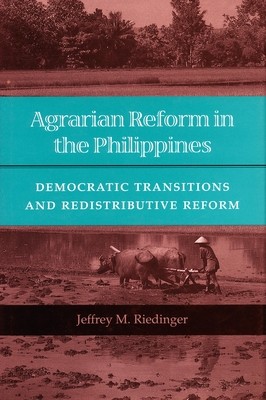
- We will send in 10–14 business days.
- Author: Jeffrey M Riedinger
- Publisher: Stanford University Press
- ISBN-10: 0804725306
- ISBN-13: 9780804725309
- Format: 15.8 x 23.6 x 3 cm, hardcover
- Language: English
- SAVE -10% with code: EXTRA
Reviews
Description
This text evaluates the capacity of new democratic regimes to promote redistributive agrarian reform, an issue of concern to developing countries throughout the world. It analyzes the problems caused by political liberalization, and social and economic reform by examining in detail the formulation and implementation of agrarian reform in the Philippines under the governments of Corazon Aquino and her successor, Fidel Ramos. It reveals how the interaction between state and society shapes policy decisions, showing that what is needed for successful agrarian reform is a combination of sustained, forceful political leadership and grassroots agitation by peasant organizations. The author concludes that the new Philippine democracy has proved more conducive to redistributive reform that the authoritarian Marcos regime but has still failed to implement the more controversial and costly elements of the reform policy.
EXTRA 10 % discount with code: EXTRA
The promotion ends in 15d.04:29:40
The discount code is valid when purchasing from 10 €. Discounts do not stack.
- Author: Jeffrey M Riedinger
- Publisher: Stanford University Press
- ISBN-10: 0804725306
- ISBN-13: 9780804725309
- Format: 15.8 x 23.6 x 3 cm, hardcover
- Language: English English
This text evaluates the capacity of new democratic regimes to promote redistributive agrarian reform, an issue of concern to developing countries throughout the world. It analyzes the problems caused by political liberalization, and social and economic reform by examining in detail the formulation and implementation of agrarian reform in the Philippines under the governments of Corazon Aquino and her successor, Fidel Ramos. It reveals how the interaction between state and society shapes policy decisions, showing that what is needed for successful agrarian reform is a combination of sustained, forceful political leadership and grassroots agitation by peasant organizations. The author concludes that the new Philippine democracy has proved more conducive to redistributive reform that the authoritarian Marcos regime but has still failed to implement the more controversial and costly elements of the reform policy.


Reviews